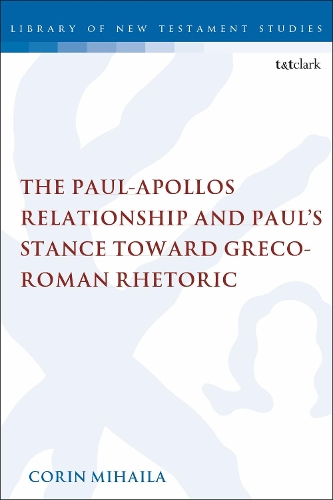
The Paul-Apollos Relationship and Paul's Stance toward Greco-Roman Rhetoric: An Exegetical and Socio-historical Study of 1 Corinthians 1-4
(Paperback)
Available Formats
Publishing Details
The Paul-Apollos Relationship and Paul's Stance toward Greco-Roman Rhetoric: An Exegetical and Socio-historical Study of 1 Corinthians 1-4
By (Author) Corin Mihaila
Bloomsbury Publishing PLC
T.& T.Clark Ltd
25th July 2019
United Kingdom
Classifications
Tertiary Education
Non Fiction
Criticism and exegesis of sacred texts
227.206
Physical Properties
Paperback
272
Width 156mm, Height 234mm
390g
Description
Research into the social and rhetorical background of the Corinthian church, shows that the Corinthians were evaluating their leaders based on their rhetorical prowess, seeking to associate with those who would enhance their status and honour. The coherence of Paul's argument in 1 Corinthians 1-4 is evaluated, particularly by showing how Paul's discourse of the cross and Sophia relate to the issue of the dissensions in the Corinthian ekklesia. Once demonstrated that there is a misunderstanding of wisdom amongst church leaders at the basis of the dissensions, a redefinition of the wisdom offered in Corinthians is required.
In what could be considered the locus of Paul's theology of proclamation (i.e., 1 Corinthians 2:1-5), he rejects any employment of worldly wisdom in his proclamation of the cross for theological reasons and will not allow himself or other leaders to be drawn into this game of personality cult and honour enhancement.
Such conclusions then raise the question of the role played by Apollos' name in Paul's argument against dissensions. After a review of several possible views, it is concludedbased primarily on exegetical grounds and refusing to engage in hermeneutical speculationsthat Paul had a congenial relationship with Apollos. If any distinction is drawn between the two, it was solely the Corinthians' fault, who viewed their preachers in competitive rather than complementary terms.
Reviews
Specialists will find this book to be a valuable resource on the Corinthian correspondence.' -- Religious Studies Review
"This exegetical and socio-historical investigation of 1 Corinthians 1-4 seeks to determine the relationship between Paul and Apollos in the light of Paul's stance toward Greco-Roman rhetoric. After a seven-page introduction, it shows the literary and thematic unity of 1 Corinthians 1-4, considers the kind of wisdom that the Corinthians appreciated, treats Paul's stance toward rhetorical eloquence, and raises the question of Apollos' function in the argument. Mihaila contends that when one takes Paul's argument and mention of Apollos at face value, it appears that Apollos and Paul shared a harmonious relationship in ministry, though Apollos was most likely an independent missionary. Thus the entire fault in the dissension lay with the Conrinthian Christians. -New Testament Abstracts, Vol. 54
'The social background is usefully discussed and worth pondering regardless of how friendly Paul may or may not have been with Apollos. After a very short introduction theliterary and thematic unity of these four chapters is established in a long opening chapter, their social and rhetorical background in a second. Chapter 3 discusses Paul and sophistic rhetoric, as refected in these chapters and chapter 4 Apollos 'function' in these four chapters. The breif summary and conclusions include 'homiletical implications'. The close attention to a very important part of the Pauline corpus makes this a monograph which many students of the New Testament could read with profit.' Robert Morgan, Linacre College, Oxford -- Robert Morgan * Theological Book Review *
Author Bio
Dr Corin Mihaila isAdjunct Professor at Liberty University, Lynchburg, VA, and the Senior Pastor of First Baptist Church, Brasov, Romania.
